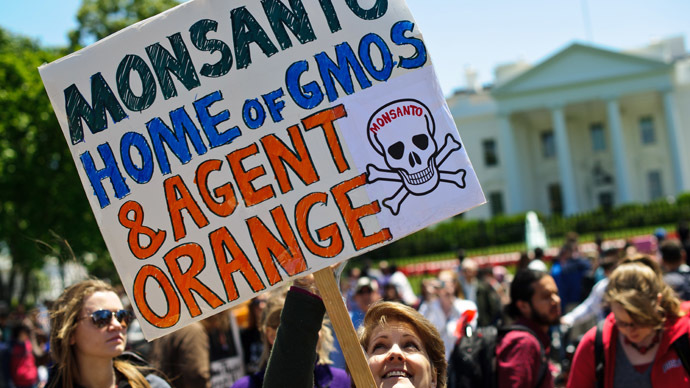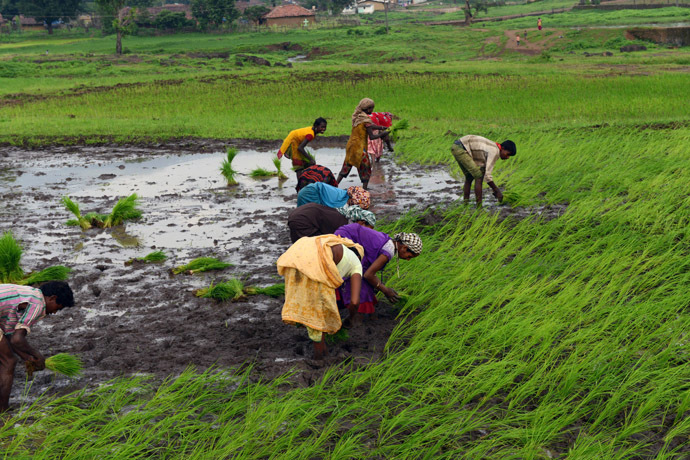‘Monsanto uses Indian farmers to contaminate world with GMO crops’

By persuading Indian farmers to buy genetically modified organism (GMO) seeds Monsanto spreads its genetically engineered crops around the world so that no one can compete with pure non-GMO products after that, anti-GMO activist Jeffrey Smith, told RT.
It is estimated a farmer commits suicide in India every thirty minutes. Over 16 years more than a quarter of a million farmers have taken their own lives in desperation of being unable to provide for their families, according to CHRGJ (Center of Human rights and global justice). One of the possible reasons for the high suicide rates is considered the advent of genetically modified crops in India.
RT:Thousands of Indian farmers have committed suicide because of Monsanto’s genetically modified crops. What makes them do this?
Jeffrey Smith: It is absolutely certain that there are a vast number of farmers in India that committed suicide due to the failure of Bt (genetically modified) crops. This has been well documented in independent investigations and even documents leaked by the central government in India. In fact in the “suicide belt” … door-to-door surveys confirmed that about 85 percent of the farmers’ homes where there was a suicide were directly linked to Bt cotton failure and about another 10 percent were indirectly linked to be Bt cotton failure. We know that there have been a huge number of suicides. The estimated number of suicides in India is close to 300,000. Not all of them are related to Bt cotton farming. But an estimated quarter of a million are.
Sheldon Krimsky, Professor at Tufts University, said on GM crops: “There is some evidence that GM crops could be a factor, [involved in the suicide rate of Indian farmers] but not for all the farmers and not for all the places.”
RT:What are the implications of such a kind of Bt failure?
JS: When you have a situation where a farmer buys the seeds and they don’t germinate, or they have lower yield, or there is some problem, and then a farmer commits suicide as a result of not being able to pay back their high interest loans to the secondary market - that is the story that has been repeated over and over again. There are newspaper reports, video interviews, and investigations. People on the ground are noting hundreds and hundreds of suicides in their region. We know that Bt cotton can cause a number of problems. As I said it can cause failure to germinate, it can have reduced yields, it can foster root rot, or leaf curl, or mealy bug Infestation. The quality of the cotton can be less, or require more labor in order to pluck it from plants. Also farmers are complaining of often getting itching, rashes when touching the cotton, and sometimes when their livestock graze on the cotton plants after harvest there is a death among those buffalo, goats and sheep. This has also been documented. So we are absolutely sure that a significant percentage of the suicides are related based on firsthand accounts and investigative reports.
Sheldon Krimsky, Professor at Tufts University, said on GM crops: “GM crops have not done as well in all regions of India, and farmers are paying more for the seeds. Some of the farmers have become indebted with GM crops which did not perform as well. In the culture of India when the farmers get very high debts they have been known to take their own lives.”
RT:Could you provide us more details. How did Monsanto manage to make farmers buy Bt GM seeds?
JS: It turns out that the cotton that is genetically engineered is unreliable. It does much better when there is irrigation. But most of the cotton farmers rely on rain fed water for their fields. And that has proved to be very unreliable. The field test that was done by Monsanto and its subsidiary Mahyco were done under ideal conditions with irrigation. They, according to many, inflated the results so that they could promise that GM crops were the road to riches. They even told specifically of certain amounts of yield they could expect if they adopted this more expensive genetically modified seeds. The farmers went to the banks to get loans for the more expensive seeds and associated chemicals. Many of them could not get loans. So they went to the secondary market where the interest rates could be as much as 7 percent per month. And then when the seeds in many of the cases did not provide even enough money to pay back this high interest loans - rather than giving up their land that has been in their family for generations, and facing that shame - many committed suicide by going into the fields and drinking the agro toxins.

RT:Why farmers can’t just work as they worked before? Is there some kind of monopoly situation on the market?
JS: Right now for cotton farmers there are certain states where it is impossible to not get GMO seeds. This has been documented in documentaries and reports on the ground. The monopoly situation is such that the higher quality non-GMO seeds have either gone completely or are very hard to obtain. Also there is a lot of disinformation that is being spread about the cotton. This is the case from the very beginning with promises of wealth. Someone for example looked at posters of farmers who supposedly made a lot of money with Bt cotton seeds, tracked down the farmers, and none of them were in fact were farmers that had said what the posters claimed that they had said. One was not a farmer at all but a cigarette salesman. It turns out when Monsanto wanted its statistics analyzed, they used a marketing company instead of a scientific organization that inflated some of the figures by as much as a hundred fold. So they are not to be relied upon, they are not trustworthy, and yet they have been very effective at lying to the farmers and creating a monopolistic situation forcing them to buy these GMO seeds.
RT:What is Monsanto’s goal in general?
JS: Monsanto would like to introduce many more types of genetically engineered crops. There is a group of biotech companies that want to introduce GM eggplant, onion, cauliflower, mustard seed etc. The government just allowed field trials of the eggplant and the mustard seed which is quite dangerous because as soon as you plant a field trial, the pollen can escape, the seeds can escape, and products can even be stolen. Then you have polluted the gene pool essentially forever. But we know from insiders that this is Monsanto’s plans. They want to have contamination with their genetically engineered crops so that no-one can compete with pure non-GMO products after that. We could say that Monsanto’s goal is to use India which is one of the largest concentrations of farmers in the world to be a source of income for their seeds and to use that to introduce many other varieties of genetically engineered crops they can then spread around the world. Once they introduce seeds into an area like with cotton they have to control the prices and availability because they buy up a lot of seed companies which they have done around the world. Even in the United States here some famers told us that it is impossible to get high quality non-GMO seeds and the research report found that 2/3 of the non-GMO seeds that were available before Monsanto and another biotech companies started in with GMOs were eliminated while the GM seeds were increased dramatically in the varieties and quality.
Sheldon Krimsky, Professor at Tufts University, said on GM crops: “A problem has to do with the variations in productivity and the farmers having to go into indebtedness sometimes because of globalization because certain countries can sell their seeds and sell their crops in India cheaper than the Indians can grow them.”
RT:Are there any positive examples here? Are there any farmers who benefited from Bt GM seeds and whose yields have increased?
JS: We do know that in some cases with irrigation the Bt cotton can increase yields. Sometimes they measure it by comparing the wrong control. They compare it to traditional crops rather than high-breeding so they exaggerate the increased yields. But there are for sure some farmers who have noticed the increase in yield under certain ideal growing conditions. But if you look at the whole most of the farmers don’t have the irrigation and are relying upon this unreliable technology that contaminates the gene pool. I wouldn’t say that Monsanto is lying to say…that in some cases farmers have benefited with increased profits. But they shouldn’t deny at the same time that thousands upon thousands perhaps a quarter of a million farmers have committed suicide because of the opposite results from Monsanto’s crops.
The statements, views and opinions expressed in this column are solely those of the author and do not necessarily represent those of RT.
The statements, views and opinions expressed in this column are solely those of the author and do not necessarily represent those of RT.












